|
|

The House of Hysteria
Clarence John Laughlin
1941 1 2 3 4 5 6 Clarence John Laughlin: Prophet Without Honor
A. J. Meek
Google Books
_______________________
The Self That Writes
Claudio Magris
Translated from the Italian by Nick Carter
Almost Island
... in some way I felt that behind the border there was something both known and unknown, and I believe that this is fundamental to literature, which is a journey from the known to the unknown, but also from the unknown to the known, to an unknown which we appropriate.
Also by passing from one room to another in one's own house, it can happen that something that was familiar up until that moment will show itself strange or disquieting. And very often something or someone that we considered distant and different turns out, instead, to be close and alike. And this identity of known/unknown has, I believe, been basic for me. I felt that in order to grow up, I would have to cross that border, not simply with a passport but also spiritually, to make mine that world which was already mine. So that border has remained for me the symbol of all the borders that fence us in....(more)
_______________________
An assembly of notes to The Grand Piano (compleat)
in 45 installments
John Latta
Isola di Rifiuti
.....................................................
The Grand Piano Project
reviews in Jacket .....................................................
The Grand Piano
_______________________
 vortex, boundary, water
Koichiro Kurita
1 2 3
_______________________
Homage to Translation: Benjamin in Japan
Forrest Gander
from A Faithful Existence: Reading, Memory, and Transcendence
Almost Island
If translation were the apparatus allowing us to approach--
If translation were always taking place as part of a politics concerned with the flow of power--
If Billie Holiday's late signature song “Strange Fruit” had been written by Able Meeropol, aka Lewis Allan, a Jewish poet from the Bronx--
If repetition were a form of translation--
If symmetry were understood as translation plus reflection--
Walter Benjamin famously wrote that a translation should have an awkwardness about it that shows off “the original's mode of signification, thus making both the original and the translation recognizable as fragments of a greater language.” He argued that translations should not attempt to ameliorate syntactical variance between two languages, but instead should celebrate the host language's instructive difference.
Curiously, Benjamin's radical claim about translation did not markedly influence his own translations of Baudelaire's Tableaux Parisian.
When I read a poem, I hear it in my thorax.
Basho praised a poetics of connotative associations, what the Japanese call “scent links” as opposed to merely thematic or linguistic links.
I often think of tone as the auditory equivalent of touch.
...(more)
see also Homage to Translation: Mexico
Homage to Translation: Argentina
_______________________
 Clarence John Laughlin
_______________________
Situations
a new chapbook by Laura Carter
ungovernable press
Scribd
Shrugging Off
In the morning, the ride to the train:
"I was told you put your feeling
to one side & music to the other."
Sabotage
of the image, a point -
caught in forest
with full moon fever taking calls -
how old were you when you noticed where you
might whant to go?
"The fern in the corner
is one part of this feeling."
I paint my hymn in history
& give & give & give & give -
difference between nerve & pulse
I write, as you keep
church. "Once I was something like you," you say.
"I was burned a heretic."
...(more)
Laura blogs at love and coffee
ungovernable press
_______________________

The Tree of Immensity
(Baton Rouge, La.)
Clarence John Laughlin
_______________________
Che Guevara Came To Me In A Dream
Anne Waldman
Almost Island
someone
somewhere
nullifies
a taut treaty
someone
somewhere
un-signifies a
weapons ban
a goal,
a basket,
a score,
a genetic assist
for what purpose?
no hidden agenda please
keep
power ethics
out in the open
where we try to sleep but can’t oh can’t sleep
in the different
time zones bodies hold…
Dear Anne:
I am trying to notify you about the service re-call to Iraq. Seems my
wounded-in-action status is low. Can the school lawyers help?
I need to spend my life in poetry not on the killing fields.
Love,
G.
...(more)
_______________________

Open Access Day - October 14, 2008
a project of
The Scholarly Publishing and Academic Resources Coalition (SPARC)
Students for FreeCulture (SFC)
The Public Library of Science (PLoS) via Tom Matrullo
 The Briar Rose
study for "The Garden Court"
Edward Burne-Jones
_______________________
Intentional Structure of the Romantic Image
In the history of Western literature, the importance of the image as a dimension of poetic language does not remain constant. One could conceive of an organization of this history in terms of the relative prominence and the changing structure of metaphor. French poetry of the sixteenth century is obviously richer and more varied in images than that of the seventeenth, and medieval poetry of the fifteenth century has a different kind of imagery than that of the thirteenth. The most recent change remote enough to be part of history takes place toward the end of the eighteenth century and coincides with the advent of romanticism. In a statement of which equivalences can be found in all European literatures, Wordsworth reproaches Pope for having abandoned the imaginative use of figural diction in favor of a merely decorative allegorization. Meanwhile the term imagination steadily grows in importance and complexity in the critical as well as in the poetic texts of the period. This evolution in poetic terminology--of which parallel instances could easily be found in France and in Germany--corresponds to a profound change in the texture of poetic diction. The change often takes the form of a return to a greater concreteness, a proliferation of natural objects that restores to the language the material substantiality which had been partially lost. At the same time, in accordance with a dialectic that is more paradoxical than may appear at first sight, the structure of the language becomes increasingly metaphorical and the image--be it under the name of symbol or even of myth--comes to be considered as the most prominent dimension of the style. This tendency is still prevalent today, among poets as well as among critics. We find it quite natural that theoretical studies such as, for example, those of Gaston Bachelard in France, of Northrop Frye in America, or of William Empson in England should take the metaphor as their starting point for an investigation of literature in general--an approach that would have been inconceivable for Boileau, for Pope, and even still for Diderot.
An abundant imagery coinciding with an equally abundant quantity of natural objects, the theme of imagination linked closely to the theme of nature, such is the fundamental ambiguity that characterizes the poetics of romanticism. The tension between the two polarities never ceases to be problematic.
- Paul de Man, The Rhetoric of Romanticism
download (doc)
.....................................................
German Idealism (21 books)
Fark Yaralari = Scars of Différance _______________________

Johann Wolfgang Goethe
28 August 1749 - 22 March 1832 Goethe's Delicate Empiricism
Janus Head
Summer 2005 | 8.1
_______________________
Werther's Law
Or Joe Biden and the Iron Law of Adverse Political Selection
Werther
To explain why the American political class invades the wrong countries, indemnifies criminals, picks people like Joe Biden for responsible positions, and engages in so many other destructive acts, we modestly propose Werther's Law, or the Iron Law of Adverse Political Selection: in decadent political systems the most damaging policy option tends to be the one chosen....(more)
Antiwar.com
_______________________

"I Have a Dream"
28 August 1963
Lincoln Memorial, Washington D.C.
_______________________
A Mills Revival?
Stanley Aronowitz
Perhaps you know Foucault’s remark that despite the torrent of criticism directed against his philosophical system, “Hegel prowls through the twentieth century.” Consigned to a kind of academic purgatory for the last three decades of the twentieth century, at a time when social theory had migrated from the social sciences obsessed with case studies and social “problems” to literature and philosophy where he was rarely discussed and almost never cited., C. Wright Mills was an absent presence. All sociologists, and most people in other social scientific disciplines knew his name, and in their political unconscious, recognized his salience, but were deterred by fear and careerism from following his path as a public political intellectual. Yet in the wake of scandals involving leading corporations and their Chief Executive and Financial Officers, which have become daily fare even in mainstream media, and the hegemony of corporate capital over the American state, which was widely reported in the press and television with unembarrassed approbation, Mills’s work is experiencing a small but pronounced revival. Although his name rarely appears on the reading lists of fashionable graduate courses in social and cultural theory, the republication of four of his major books, with new introductions by the historian Nelson Lichtenstein (New Men of Power), the social critic Russell Jacoby (White Collar) political theorist Alan Wolfe (The Power Elite), and sociologist Todd Gitlin (The Sociological Imagination) is likely to aid in exposing his work to students and younger faculty. ...(more) Logos

C Wright Mills
August 28, 1916 – March 20, 1962
The Power Elite
C.Wright Mills
excerpts
C. Wright Mills, Free Radical
Todd Gitlin
_______________________

Cupid Delivering Psyche
Edward Burne-Jones
b. 28 August 1833
_______________________
from
Beyond Another Ocean
Notes By C. Pacheco
Fernando Pessoa
Translated by Chris Daniels
In a fevered feeling of being beyond another ocean
There were positions of a living more clear and limpid
And apparitions of a city of beings
Not unreal but livid with impossibility, sacred in purity and in nudity
I was the gateway to this null vision and the feelings were only the desire to have them
The notion of things beside themselves, each with their own inwardness
All were living in the life of remnants
And the mode of feeling was in the mode of living
But the form of those faces had the placidity of dew
Their nudity was a silence of forms without means of being
And there was wonder at all reality being only this
But life was life and it was only life
Often my thought works in silence
As smoothly as a greased machine moves without a sound
I feel good when it so moves and I immobilize
So as not to break the equilibrium that allows this to occur in me
I foresee that it is in these moments that my thought is clear
But I do not hear it and it works stealthily and in silence
Like a greased machine driven by a belt
And I can hear nothing but the serene sliding of the parts at work
Sometimes I recall that all other persons must feel the way I do
But they say it gives them a headache or causes dizziness
This recollection came to me as could any other
As for example the recollection that people do not feel the sliding
And they do not think what they do not feel
...(more)
Fascicle
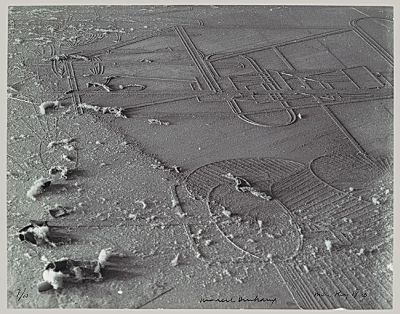
Dust Breeding
Detail from the Large Glass by Marcel Duchamp
Man Ray
1920
.....................................................
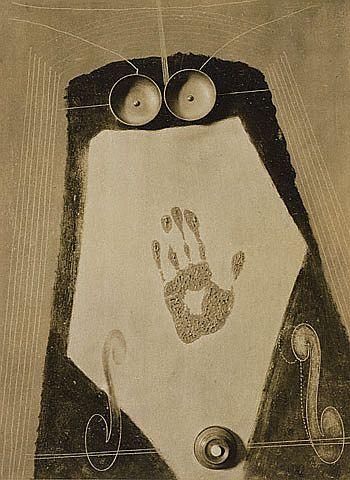
Man Ray
August 27, 1890–November 18, 1976
_______________________
On the Public Sphere, Deliberation, Journalism and Dignity
Seyla Benhabib interviewed by Karin Wahl-Jorgensen
I used to be more optimistic about the possibility of social movements and civil society institutions impacting the strong public. And I still think that this is the only thing that we can hope for and the Obama candidacy shows that civil and political movements are not completely asleep in the USA. But the last 10 or 15 years I have been increasingly more struck about the fragmentation of the public sphere. The emergence of new media technologies, and new centres of information is leading to everyone doing their “own thing,” so to speak. It’s as if people are going around with bubble wrap around their brains. And inside the bubble wrap is the informational world that they themselves have generated. When we first articulated this model about the interaction of the strong and weak public spheres in the late 1980s and 1990s, many of us were thinking of transformations in Eastern Europe, the emergence of civil society movements, strong women’s movements, ecology and youth movements in the West, and so the model was one of a decentred, weak public sphere of anonymous conversations and networks that would then have some impact on the decisional public sphere. Now, we need to reconsider this model in the light of the complete proliferation of the electronic media and public spheres - the rise of FaceBook; YouTube; community and citizen journalism, etc…...(more)
Reset - Dialogues on Civilizations
via 3quarksdaily
_______________________
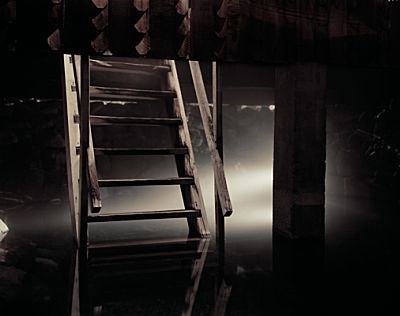
Adam Jeppesen
via exposure project
_______________________
Twisting the concept of 'elite'
Linda McQuaig
toronto star
A fundamental problem in the last few decades – both in Canada and the United States – has been the relentless campaign waged by the financial elite to overturn postwar social and economic policies that provided significant gains for the middle and lower classes in the decades following World War II.
The campaign has been phenomenally successful. As a result, the poor have lost ground, while the middle class have barely held their own or made small advances – by working longer hours or having two-income families.
Only the rich have thrived. And they have truly thrived. A group of international economists, including McMaster University's Michael Veall, has tracked the spectacular gains of the top 1 per cent of income earners, who now, in both Canada and the U.S., enjoy over 15 per cent of national income – a level not seen since the days of the idle rich in the Roaring '20s.
Yet even as the rich have redirected income towards themselves, they've managed to remove the issue of economic inequality from the agenda. Part of the strategy – honed by media-savvy conservative think-tanks and commentators – has been to redefine the notion of elitism to refer to those who belong to the liberal elite, and do things like drink lattes, maintain an international outlook and speak articulately. ...(more)
_______________________
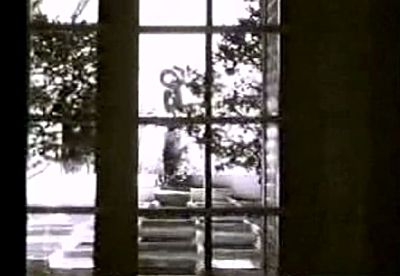
Les Mystères Du Château Du Dé
Man Ray at UbuWeb Film
_______________________
Katrina Pain Index: New Orleans Three Years Later
Bill Quigley
0. Number of renters in Louisiana who have received financial assistance from the $10 billion federal post-Katrina rebuilding program Road Home Community Development Block Grant — compared to 116,708 homeowners.
0. Number of apartments currently being built to replace the 963 public housing apartments formerly occupied and now demolished at the St. Bernard Housing Development.
...(more)
_______________________
UPDATE: Free Fire Zone Afghanistan
"Following an investigation by their Assistance Mission for Afghanistan, the United Nations has announced that it is convinced that a minimum of 90 civilians were killed in Friday's US airstrike in Herat Province. This number, they reported, included 60 children, and stands as one of the largest incidents of US-inflicted civilian casualties since the 2001 invasion."
- toronto star
_______________________
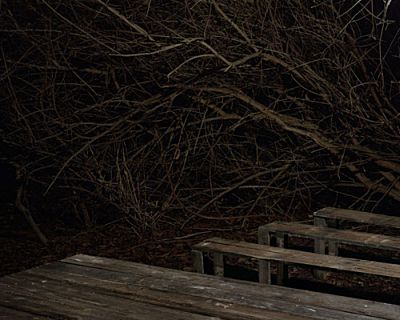
Bianca Brunner
1 2 3 4

Luis González Palma
Guatemala 1 2 The Postmodern Romantic
An Interview with Luis González Palma
raintaxi
Light and darkness, song and scream,
the photographic work of Luis Gonzáles Palma
Fernando Castro R.
_______________________
His prayers are evil who hopes to have someone to hate or to fear in order to conquer them. If, therefore, it was by waging 'just wars,' not impious or iniquitous ones that the Romans were able to acquire so great an empire, why shouldn't Foreign Iniquity also be worshipped by them as a goddess? For we see that She has contributed much to the extension of empire, she who fabricated unjust foes so that there would be enemies with whom the Romans could wage just wars and augment their empire. Why, moreover, should'nt Iniquity also be a goddess -- at least one of foreign nations -- if Trembling Fear, Pale Terror, and Fever have merited being Roman gods?
-
Augustine Of Hippo, The City of God
The Massacre of the Innocents
Augustine of Epcot and his Scribe
Daniel White
The City of Disney Book XI ctheory
I went to Epcot (may its name be blessed) with Augustine in Late July to visit the World of Shops orbiting the Pond of Fireworks, but, despite our apparent connections with Divinity, we were forced into Parking Remote from the Kingdom. During the long wandering in Exile on the Asphalt Plain, the City's neon Glow on our horizon, my Mentor stopped suddenly, transfixed, seeming to look into the Sun (towed across the sky by Tinker Bell), and began to report a Vision which, I must divulge for the sake of objectivity and fairness, may not have been genuinely inspired by Walt but, alas, only the result of Heat Stroke consequent on Republican "Climate Change" (for we 'Americans' must not use the forbidden phrase, "Global W*****g"). Inspired by his new Insight, he pumped the saintly Bellows of the Spiritus Sanctus, detailing a vision itself revealed by Pageant Wagons peopled by a curious assemblage of Dramatis Personae, all of which took shape like an informatic mirage from his words, which I shall do my best to relate....(more)
_______________________
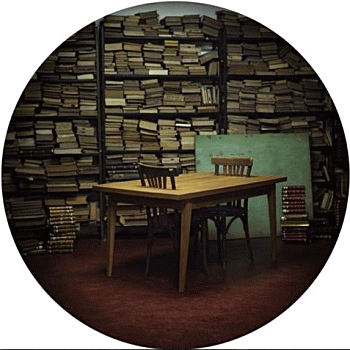
Luis González Palma
_______________________
Technological Fundamentalism in Media and Culture
Robert Jensen
Fundamentalism shows up in history often enough, in enough places, that it seems to be a feature not of a particular culture but of human psychology — we humans are prone, though one hopes not doomed, to fundamentalist thinking. The attraction of fundamentalism is not hard to understand; in a maddeningly complex world, such a way of thinking can offer comfort, even if illusory. But fundamentalism is better described as a system of non-thought, for as ecologist Wes Jackson puts it, “fundamentalism takes over where thought leaves off.”
Journalists are conscious of religious fundamentalism and treat it as a phenomenon to be covered, even if they don’t always explore it in much depth. But other fundamentalisms — which likely are even more dangerous than the religious varieties — are the water in which journalists swim, rarely reported upon and usually taken as an unquestioned state of nature. This includes national fundamentalism (the belief that we owe loyalty to nation-states and that patriotism is a good thing) and market fundamentalism (the belief that market-based corporate capitalism is the only rational way to organize an economy in the contemporary world).
But it may well turn out that the gravest threat to a just and sustainable human presence on the planet is technological fundamentalism — the notion that the increasing use of increasingly more sophisticated high-energy advanced technology is always a good thing and that any problems caused by the unintended consequences of such technology eventually can be remedied by more technology. ...(more)
_______________________
 Gutenberg
Boru O’Brien O’Connell
An Interview with Photographer Boru O’Brien O’Connell
We Can’t Paint Blog
via Shane Lavalette
_______________________
Fifth Canon Consciousness: Classical and Electric Rhetorics
--An Interview with Kathleen Welch
author of Electric Rhetoric: Classical Rhetoric, Oralism, and New Literacy and The Contemporary Reception of Classical Rhetoric: Appropriations of Ancient Discourse
Kairos
A Journal of Rhetoric, Technology, and Pedagogy
via Philosophy's Other: Theory On The Web
_______________________

California Sycamores
Big Sur
California Trees
Karen Halverson
_______________________
The Problem is Civil Obedience
Howard Zinn
1970
... our topic is topsy-turvy: civil disobedience. As soon as you say the topic is civil disobedience, you are saying our problem is civil disobedience. That is not our problem.... Our problem is civil obedience. Our problem is the numbers of people all over the world who have obeyed the dictates of the leaders of their government and have gone to war, and millions have been killed because of this obedience. And our problem is that scene in All Quiet on the Western Front where the schoolboys march off dutifully in a line to war. Our problem is that people are obedient all over the world, in the face of poverty and starvation and stupidity, and war and cruelty. Our problem is that people are obedient while the jails are full of petty thieves, and all the while the grand thieves are running the country. That's our problem. We recognize this for Nazi Germany. We know that the problem there was obedience, that the people obeyed Hitler. People obeyed; that was wrong. They should have challenged, and they should have resisted; and if we were only there, we would have showed them. Even in Stalin's Russia we can understand that; people are obedient, all these herdlike people.
But America is different. ...(more)
_______________________

The City
Frans Masereel
(1889-1972) via Plep - NY and the sorely missed Giornale Nuovo
_______________________
"The quotation in my works are like robbers lying in ambush on the highway to attack the passerby with weapons drawn and rob him of his conviction."(...)
Benjamin, who for his entire life pursued the idea of writing a work made up entirely of quotations, had understood that the authority involved by the quotation is founded precisely on the destruction of the authority that is attributed to a certain text by its situation in the history of culture.(...)
This particular way of entering into a relation with the past also constitutes the foundation of the activity of a figure with which Benjamin felt an instictive affinity: that of the collector. The collector also "quotes" the object outside its context and in this way destroys the order inside which it finds its value and meaning.(...)
The interruption of tradition, which is for us now a fait accompli, opens an era in which no link is possible between old and new, if not the infinite accumulation of the old in a sort of monstrous archive or the alientation effected by the very means that is supposed to help with the transmissin of the old. Like the castle in Kafka's novel, which burdens the village with the obscurity of its decrees and the multiplicity of its offices, the accumulated culture has lost its living meaning and hangs over man like a threat in which he can in no way recognize himself. Suspended in the void between old and new, past and future, man is projected into time as into somethin alien that incessantly elludes him and still drags him forward, but without allowing him to find his ground in it.
-
Giorgio Agamben, The Man Wiithout Content, translated by Georgi Albert
_______________________

Nicholas Ranch
Cosumnes River Preserve
Karen Halverson
_______________________
For No Clear Reason
Robert Creeley
I dreamt last night
the fright was over, that
the dust came, and then water,
and women and men, together
again, and all was quiet
in the dim moon’s light.
A paean of such patience—
laughing, laughing at me,
and the days extend over
the earth’s great cover,
grass, trees, and flower-
ing season, for no clear reason.
from the new Selected Poems of Robert Creeley edited by Benjamin Friedlander
courtesy of Philip Metres
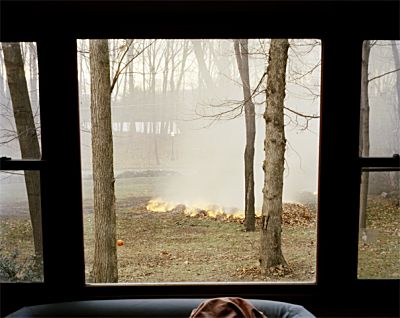
Michael Marcelle via The Exposure Project
_______________________
Cambden the nourice of antiquitie,
And lanterne vnto late succeeding age,
To see the light of simple veritie,
Buried in ruines, through the great outrage
Of her owne people, led with warlike rage;
Cambden, though Time all moniments obscure,
Yet thy iust labours euer shall endure.
But whie (vnhappie wight) doo I thus crie,
And grieue that my remembrance quite is raced
Out of the knowledge of posteritie,
And all my antique moniments defaced?
Sith I doo dailie see things highest placed,
So soone as fates their vitall thred haue neuer borne.
- Edmund Spenser, The Ruines of Time
Translated Geographies: Edmund Spenser's "The Ruines of Time"
Huw Griffiths
The two ironic movements that I want to talk about in relation to "The Ruines of Time" are the trope of the ruin and the troping mechanism of translation. In turn, both these movements will be looked at in relation to the Elizabethan development of a national geography. So, whilst this paper has a particularly narrow focus -- one relatively obscure poem by Edmund Spenser -- I believe it to have broader significances in a wider project that might seek to interrogate the notion of translation within the national cultures of the early modern period. One way of performing that interrogation of translation within a nationalist context is to rethink translation in spatial terms. Homi Bhabha has written on this in a postcolonial framework in his essay, "How Newness Enters the World." There he talks about "the disjunctive temporality of translation" which "reveals the intimate differences between genealogies and geographies." The movement of a translation across borders reveals the ironies of the nationalist project, rooted in heredity -- the ancient history of the nation. Translation's "disjunctive temporality," crossing and marking the borders of time and space, renders ironic a national history based on self recognition and continuity. The spatial implications of the word "translation" of course have a history that extends beyond postmodern critique, and the paper will also look at the functioning of the early modern translatio imperii in Spenser's poem....(more)
Literature and Geography
Early Modern Literary Studies 4.2/ Special Issue 3 (September, 1998)
_______________________
Informatics, in our occasion, is a form of power that, in its transcendental stupidity, tries to harness all antagonistic desires into a hermeneutic of consumer culture and a behavioralist sociology of the human.
The Human and his Spectacular Autumn, or, Informatics after
PhilosophyAnustup Basu reflects on Gabriel García Márquez's novel El Otono del Patriarcapmc
The search for another form of politics has to begin with a critique of the aphasic, self-conscious navel-gazing of the North Atlantic intellectual, who approaches a state of stupefied entropy on looking at a monstrous military-informatic-financial assemblage which has reduced the great modernist projects of culture and ideology to incidental arrangements that can be only locally applied. To restrict an understanding of the political that is emergent to a set of cognitive phenomenological tasks of the human subject, who, as Foucault points out, is an empirico-transcendental fiction of the West very much in the twilight of his career, would be, in the last instance, subscribing to a transcendental stupidity not dissimilar from that of informatics itself. That is, the assumption that today everything and everybody is already spoken for, evaluated, and ordered by the hidden tongue of the market, instead of by the king or the philosopher of yore. This is why, when all of us are irremediably tinged with the curse of money, a caricature of liberal political action, conducted through conservative channels of human conscience and morality, becomes part of an overall shareholding of neo-imperial "guilt."
A new form of political thinking has to begin by taking into account vast amounts of energies in the world antagonistic to capital in terms that do not refer back to the normalcy of the human subject inaugurated by the classical enlightenment of Europe. It is part of the transcendental stupidity of geo-televisuality to impart such hostile energies with a catalogue of profiles: the criminal, the delinquent, the madman, the Negro, the woman, the child, the African AIDS victim, the poor, the unemployed, the illegal immigrant, or the terrorist. Informatics is about the reporting of the state's pharmacopic action on these bodies, as objects of charity, aid, medication, schooling, or military intervention. This is why the unspeakable antagonism of living labor in the world is never "visible" on CNN or any other corporate geo-televisual schema of metropolitan representation. The latter can discern only the ontology of money and its coalitionary interests; humans, who are only refugees great and small, can only climb into one or many of the designated profiles of massification. The centralizing, perspectivist drive of CNN--as a repetitive human psychodrama of development, birthpangs of modernity in the frontier, subjugated and freed consumer desires--overlooks forces from the margins of the frame in trying to fit entire crowds into the telegenic face. Labor and its multiple wills to antagonism (of which various narratives of resistance are only partial but undeniably important molar expressions) are actually unrepresentable precisely because they lack a "human" face. Global antagonisms to capital are at once utopic (as in "non-place," since the logic of globalization cannot posit an "outside") and pantopic; they are, in multiple forms, and in different degrees of sublimation, nowhere and everywhere. They constitute a gargantuan beastly body that Hegel feared, in being a passional, multitudinal formation no longer guided by the soul of humanism....(more)
_______________________

Meadowlands
Joshua Lutz via
_______________________
What will America look like in two years?
Joe Bageant
America is now a totalist state. This seems not so apparent because of the glossy "commercial skin" over everything. Shining goods, much meaningless commercial activity, the energy of every able person dedicated to profit making activity in the name of "the economy," which has become god, yet no one can define it except in the language of Wall Street and the stock market -- a faceless god in itself. Interestingly, the stock market goes up when people are paid less or more people are unemployed, etc., yet people have accepted its terms as the definition of their well being.
The rise of this state has required increased police forces and heavy-handed enforcement, thus we hold one-quarter of the world's prison population, though we are only six percent of the earth's population.
The elections are an illusion. A totalitarian state loves nothing more than elections, which gives the illusion of choice on the part of the people. The people, after so many generations of this illusory choice, believe it themselves.(....)
It's going to take what most people outside the US would consider a ridiculous level of disaster before most Americans understand that something is deeply wrong with the trajectory of their nation. Personally, I think we are years away from that realization -- decades away if we can steal enough oil and keep printing enough fiat currency to keep the public fooled.
No candidate is going to deal with any of these larger things because:
1. It is political suicide to even mention them.
2. There is no commonly accessible language in which to publicly discuss real and very serious weaknesses in the American system. There isn't even an opposition party, just one party. The party of business, wearing two masks.
Even the best of humans here are left with only the illusion of a humane candidate -- Obama. He has become a cult figure, a messiah to some, merely because they know that at least he will not attack other nations without reasonable provocation. And that, my friend, is a sad state of affairs. Choosing a president simply because he is not a cold blooded killer. Of course, there is an equal number who would choose a candidate because he IS a cold killer -- it makes them feel safer.
Meanwhile, I am of the same camp as the rest of Americans. It's still quite a comfortable place to live -- if you don't mind living in a police state, living a life with only two parts, the inside of your house and the inside of your assigned workplace. I am stuck here in the US for a while on book business, Fortunately, when I am here I tend to be satisfied with alcohol and television, so at this particular moment I have no complaints. I am truly an American....(more)
_______________________
What is new in the post-9/11 period is the fact that U.S. empire and U.S. imperialism is more nakedly promoted than at any time since the Spanish-American War at the very end of the nineteenth century.
- John Bellamy Foster
_______________________
As an economically embattled US flails after former glories, it fashions Nato into a blunt instrument. Whatever the organisation's purpose during the Cold War, it currently stands revealed as an expeditionary force on behalf of Washington's interests. That is not a useful development for Nato, Europe, America or the world.
- Ian Bell
_______________________
Afghan Civilians Bear the Brunt of Taliban Violence and US, NATO Bombings
Sonali Kolhatkar, host of Uprising on Pacifica radio station KPFK and co-author of the book “Bleeding Afghanistan.”
_______________________

Don't Be Afraid
Mary Margaret O'Hara
from September Songs: The Music of Kurt Weill
youtube
When you know why your happy
Bodies in Trouble Dark Dear Heart
Year in Song
_______________________
Misc. Proj
a continuation using blog software of the poetry magazine and newsletter, Misc. Proj., which was published out of Atlanta for several years in the late nineties.
five issues in Misc. Proj's inital run (1996-1998). They are downloadable in .pdf format. via Crg Hill's poetry scorecard
_______________________
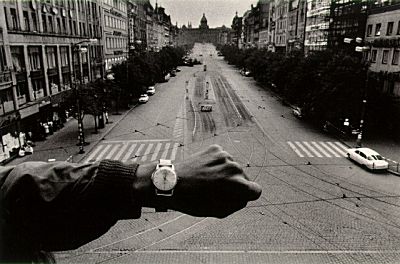
Josef Koudelka 1 2
40 years on: the exile comes home to Prague
Sean O'Hagan
Koudelka has returned to Prague from his adopted home in Paris for an exhibition of his '68 photographs that is being held in the Old Town Hall to coincide with the 40th anniversary of the invasion. A book called Invasion 68: Prague was published earlier this year, an extraordinary chronicle of those convulsive seven days when the people of Prague, young and old, took to the streets in their thousands to protest at the Russian presence.
_______________________

Black Moshannon State Park
Dave Bonta
Via Negativa

Memory Harbour
Jack Butler Yeats
1871-1957
_______________________
Intensity of Illusion:
a conversation with Barry Unsworth
Littoral: the blog of the Key West Literary Seminar
How my relationship to English has been affected by living away from the country is difficult to know; it would be a slow and probably imperceptible process, a sort of linguistic decay, which one would hardly be aware of from day to day. My style has grown terser and sparer, less exuberantly metaphorical, less joyous in a way. But that may well be due to the sobering effect of the years. Anyway, as I draw nearer to 80, I like to interpret it that way.
Experience changes us, modifies the sensibility, but we still go on shaping narratives, trying to dredge the stuff up.
Writers of historical fiction are not under the same obligation as historians to find evidence for the statements they make. For us it is sufficient if what we say can't be disproved or shown to be false. We are quite at ease in this no man's land of ignorance and doubt and dispute, absorbed in the ambiguities of trying to reach truth by mixing fact with invention. The search for truth in historical fiction– in fiction of any kind– is really a search for intensity of illusion. If this is achieved, the events and characters will take on a deeper reality than could ever be achieved by fidelity to the facts of the matter....(more)
via NewPages Blog
_______________________
 photo - mw
_______________________
"Conformity is one of the nihilistic temptations of rebellion which dominate a large part of our intellectual history. It demonstrates how the rebel who takes to action is tempted to succumb, if he forgets his origins, to the most absolute conformity. And so explains the twentieth century."
- Albert Camus
The Devolution of the Baby Boom Generation
John F. Miglio
Camus was right, of course. As a baby boomer, it doesn't make me happy to say this; however, how else does one explain the "absolute conformity" (not to mention hypocrisy) of my once-rebellious generation? How else does one explain the disgraceful situation in which our country now finds itself?
We can't blame Nixon any more, although it would be fun to still kick him around. No, we have to look inward. We're the ones who created this mess. We're the ones who abrogated our political idealism and slowly but surely conformed to establishment power and corporate materialism. And we're the ones who allowed George W. Bush, a baby boomer of the worst sort, to slime his way into the presidency and bankrupt the country both economically and morally....(more)
_______________________

Nikolai Koulebyakin
Photographer Ru
_______________________
Without effort, he had learned English, French, Portuguese, Latin. I suspect, nevertheless, that he was not very capable of thought. To think is to forget a difference, to generalize, to abstract. In the overly replete world of Funes there were nothing but details, almost contiguous details.
The equivocal clarity of dawn penetrated along the earthen patio.
Then it was that I saw the face of the voice which had spoken all through the night. Ireneo was nineteen years old; he had been born in 1868; he seemed as monumental as bronze, more ancient than Egypt, anterior to the prophecies and the pyramids. It occurred to me that each one of my words (each one of my gestures) would live on in his implacable memory; I was benumbed by the fear of multiplying superfluous gestures
Funes, the Memorious
Jorge Luis Borges
Translated by Anthony Kerrigan
.....................................................
"Blindly the uncertain soul asks to continue"

Jorge Luis Borges
August 24, 1899 -June 14, 1986
photo - Alicia D'Amico
Garden of Forking Paths
.....................................................
The Library of Babel
Jorge Luis Borges
Translated by J. E. I.
The methodical task of writing distracts me from the present state of men. The certitude that everything has been written negates us or turns us into phantoms. I know of districts in which the young men prostrate themselves before books and kiss their pages in a barbarous manner, but they do not know how to decipher a single letter. Epidemics, heretical conflicts, peregrinations which inevitably degenerate into banditry, have decimated the population. I believe I have mentioned suicides, more and more frequent with the years. Perhaps my old age and fearfulness deceive me, but I suspect that the human species -- the unique species -- is about to be extinguished, but the Library will endure: illuminated, solitary, infinite, perfectly motionless, equipped with precious volumes, useless, incorruptible, secret.
I have just written the word ``infinite.'' I have not interpolated this adjective out of rhetorical habit; I say that it is not illogical to think that the world is infinite. Those who judge it to be limited postulate that in remote places the corridors and stairways and hexagons can conceivably come to an end -- which is absurd. Those who imagine it to be without limit forget that the possible number of books does have such a limit. I venture to suggest this solution to the ancient problem: The Library is unlimited and cyclical. If an eternal traveler were to cross it in any direction, after centuries he would see that the same volumes were repeated in the same disorder (which, thus repeated, would be an order: the Order). My solitude is gladdened by this elegant hope....(more)
_______________________

The Banksia Men Make a Wicked Plot
The Tales of Snugglepot and Cuddlepie
May Gibbs (1877-1969)
illustrations scanned by peacay
BibliOdyssey
_______________________
Richard J. Cox (Reading Archives ) reviews Always Already New: Media, History, and the Data of Culture by Lisa Gitelman
_______________________
Richard Powers Interview
Salon
We have created this life that once did our bidding and now is calling the shots. We don't consider the roles that we're taking in making the world the way it is. These things are the realizations of our desire to conquer matter and time and to live on our own terms, and it behooves us to look at the degree to which we can't have life on our own terms and the attempt to do so is deeply poisoning and alienating. ...(...)
I would say the flip side to my fascination with systems is a fascination with components. So many of my books are dialogues between little and big. There's this desire to see how the parts of the whole can see the whole, come to know it, suffer the consequences of it. Fiction may do that -- implicitly, anyway. There's always a way of reading a book -- however minimal, however well behaved, however domestic -- as a consequence of systems that lie just offstage in the lives of the people whose tragedies you're being caught up in. What may make my books my own is this desire to bring those offstage elements on, and make them characters. There are books by my contemporaries in which the protagonist is a mathematician or a physicist and may do things that are supposed to be vaguely mathematical or physical, but these are just used to invoke a theme. Look, the world isn't simply taking place at eye-level view, there's lots going on above us and below us. And why not make those levels part of the dramatic structure or the narrative structure?
Some readers resist that.
I don't know if it can always succeed. We learn how to read by what we've read and by what exists, and I suspect that most people probably find that desire to bring in levels above or below an individual character difficult to engage emotionally. We have this sense that structure is inimical to emotion or that systems are inimical to individuals, you know, that a book can either be a heart book or a head book. And my desire, of course, is to write something that's like us, namely an all-in-one....(more)
_______________________
 Bedford Mill
photo - mw
_______________________
Oblomov
Ivan Aleksandrovich Goncharov
Translated from the Russian by C. J. Hogarth
We find ourselves transported to a land where neither sea nor mountains nor crags nor precipices nor lonely forests exist--where, in short, there exists nothing grand or wild or immense.
Of what advantage, indeed, is the grand, the immense? The ocean depresses the soul of man, and at the sight of its boundless expanse of billows--an expanse whereon the weary eye is allowed no resting-place from the uniformity of the picture--the heart of man grows troubled within him, and he derives no solace from the roaring and mad rolling of the waves. Ever since the world began, those waves have sung the same dim, enigmatical song. Ever since the world began, they have voiced but the querulous lament of a monster which, everlastingly doomed to torment, utters a chorus of shrill, malicious cries. On the shores of the sea no bird warbles; only the silent gulls, like lost spirits, flit wearily along its margin, or circle over its surface. In the presence of that turmoil of nature the roar even of the wildest beast sounds weak, and the voice of man becomes wholly overwhelmed. Yes, beside it man's form looks so small and fragile that it is swallowed up amid the myriad details of the gigantic picture. That alone may be why contemplation of the ocean depresses man's soul. During periods, also, of calm and immobility his spirit derives no comfort from the spectacle; for in the scarcely perceptible oscillation of the watery mass he sees ever the slumbering, incomprehensible force which, until recently, has been mocking his proud will and, as it were, submerging his boldest schemes, his most dearly cherished labours and endeavours.
In the same way, mountains and gorges were not created to afford man encouragement, inasmuch as, with their terrible, menacing aspect, they seem to him the fangs and talons of some gigantic wild beast--of a beast which is reaching forth in an effort to devour him. Too vividly they remind him of his own frail build; too painfully they cause him to go in fear for his life. And over the summits of those crags and precipices the heavens look so remote and unattainable that they seem to have become removed out of the ken of humanity.
Not so that peaceful corner of the earth upon which our hero, in his slumber, opened his eyes. There, on the contrary, the heavens seemed to hug the earth--not in order that they might the better aim their thunderbolts, but in order that they might the closer enfold it in a loving embrace. In fact, they hovered low in order that, like a sheltering, paternal roof, they might guard this chosen corner of the earth from every adversity. Meanwhile the sun shone warm and bright during half the year, and, withdrawing, did so so slowly and reluctantly that it seemed ever to be turning back for one more look at the beloved spot, as though wishing to give it one more bright, warm day before the approaching weather of autumn. Also the hills of that spot were no more than reduced models of the terrible mountains which, in other localities, rear themselves to aff right the imagination. Rather, they resembled the gentle slopes down which one may roll in sport, or where one may sit and gaze dreamily at the declining sun. Below them, toying and frisking, ran a stream. In one place it discharged itself into a broad pool, in another it hurried along in a narrow thread, in a third it slackened its pace to a sudden mood of reverie, and, barely gliding over the stones, threw out on either side small rivulets whereof the gentle burbling seemed to invite sleep. Everywhere the vicinity of this corner of the earth presented a series of landscape studies and cheerful, smiling vistas. The sandy, shelving bank of the stream, a small copse which descended from the summit of that bank to the water, a winding ravine of which the depths were penetrated by a rill, a plantation of birch-trees--all these things seemed purposely to be fitted into one another, and to have been drawn by the hand of a master. Both the troubled heart and the heart which has never known care might have yearned to hide themselves in this forgotten corner of the world, and to live its life of ineffable happiness. Everything promised a quiet existence which should last until the grey hairs were come, and thereafter a death so gradual as almost to resemble the approach of sleep.
_______________________
 photo - mw

Dieppe, France, 1926
Henri Cartier-Bresson
_______________________
We must select the illusion which appeals to our temperament,
and embrace it with passion.
-
Cyril Connolly (1903-1974)
_______________________
...there is in the life of a collector a dialectical tension between
the poles of disorder and order.
Illuminations: Essays and Reflections Walter Benjamin translated by Harry Zohn
edited, with an introduction by Hannah Arendt pdf hererapidshare
Unpacking My Library
A Talk about Book Collecting
I am unpacking my library. Yes, I am. The books are not yet on the shelves, ~ot yet touched by the mild boredom of order. I cannot march up and down their ranks to pass them in review before a friendly audience. You need not fear any of that. Instead, I must ask you to join me in the disorder of crates that have been wrenched open, the air saturated with the dust of wood, the floor covered with tom paper, to join me among piles of volumes that are seeing daylight again after two years of darkness, so that you may be ready to share with me a bit of the mood-it is certainly not an elegiac mood but, rather, one of anticipation- which these books arouse in a genuine collector. For such a man is speaking to you, and on closer scrutiny he proves to be speaking only about himself. Would it not be presumptuous of me if, in order to appear convincingly objective and down-toearth, I enumerated for you the main sections or prize pieces of a library, if I presented you with their history or even their usefulness to a writer? I, for one, have in mind something less obscure, something more palpable than that; what I am really con .. cerned with is giving you some insight into the relationship of a book coUector to his possessions, into collecting rather than a collection. If I do this by elaborating on the various ways of acquiring books, this is something entirely arbitrary. This or any other procedure is merely a -dam against the spring tide of memories which surges toward any collector as he contemplates his possessions. Every passion borders on the chaotic, but the collector's passion borders on the chaos of memories. More than that: the chance, the fate, that suffuse the past before my eyes are conspicuously present in the accustomed confusion of these books. For what else is this collection but a disorder to which habit has accommodated itself to such an extent that it can appear as order? You have all heard of people whom the loss of their books has turned into invalids, or of those who in order to acquire them became criminals. These are the very areas in which any order is a balancing act of extreme precariousness. "The only exact knowledge there is," said Anatole France, "is the knowledge of the date of publication and the format of books." And indeed, if there is a counterpart to the confusion of a library, it is the order of its catalogue.
_______________________
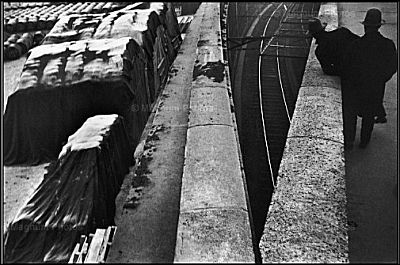
The Quai St Bernard
1932
Henri Cartier-Bresson
August 22, 1908 - August 3, 2004
1 2 3 The Decisive Moment
Henri Cartier-Bresson
_______________________
People vs. Multitude: Hobbes and Spinoza
I maintain that the concept of “multitude,” as opposed to the more familiar concept of “people,” is a crucial tool for every careful analysis of the contemporary public sphere. One must keep in mind that the choice between “people” and “multitude” was at the heart of the practical controversies (the establishing of centralized modern States, religious wars, etc.) and of the theoretical-philosophical controversies of the seventeenth century. These two competing concepts, forged in the fires of intense clashes, played a primary role in the definition of the political-social categories of the modern era. It was the notion of “people” which prevailed. “Multitude” is the losing term, the concept which got the worst of it. In describing the forms of associative life and of the public spirit of the newly constituted great States, one no longer spoke of multitude, but of people. But we need to ask whether, today, at the end of a long cycle, the old dispute has not been opened up once again; whether, today, now that the political theory of the modern era is going through a radical crisis, this once defeated notion is not displaying extraordinary vitality, thus taking its dramatic revenge.
The two polarities, people and multitude, have Hobbes and Spinoza as their putative fathers. For Spinoza, the multitudo indicates a plurality which persists as such in the public scene, in collective action, in the handling of communal affairs, without converging into a One, without evaporating within a centripetal form of motion. Multitude is the form of social and political existence for the many, seen as being many: a permanent form, not an episodic or interstitial form. For Spinoza, the multitudo is the architrave of civil liberties (Spinoza, Tractatus Politicus).
Hobbes detests—and I am using here, after due consideration, a passionate, not very scientific word—the multitude; he rages against it. In the social and political existence of the many, seen as being many, in the plurality which does not converge into a synthetic unity, he sees the greatest danger of a “supreme empire”; that is to say, for that monopoly of political decision-making which is the State. The best way to understand the significance of a concept—multitude, in this case—is to examine it with the eyes of one who has fought it tenaciously. The person who grasps all the implications and the nuances of a concept is precisely the one who wishes to expunge it from the theoretical and practical horizon.
A Grammar of the Multitude
For an Analysis of Contemporary Forms of Life
Paolo Virno
Translated by Isabella Bertoletti, James Cascaito and Andrea Casson
pdf here
_______________________

Dagwood on Détournement
Situationist International Anthology
Bureau of Public Secrets Ten Years on the Web
Ken Knabb on the anniversary of
The Bureau of Public Secrets
_______________________
America's Outrageous War Economy!
Pentagon can't find $2.3 trillion, wasting trillions on 'national defense'
Paul B. Farrell
Yes, America's economy is a war economy. Not a "manufacturing" economy. Not an "agricultural" economy. Nor a "service" economy. Not even a "consumer" economy.
Seriously, I looked into your eyes, America, saw deep into your soul. So let's get honest and officially call it "America's Outrageous War Economy." Admit it: we secretly love our war economy. And that's the answer to Jim Grant's thought-provoking question last month in the Wall Street Journal -- "Why No Outrage?"
There really is only one answer: Deep inside we love war. We want war. Need it. Relish it. Thrive on war. War is in our genes, deep in our DNA. War excites our economic brain. War drives our entrepreneurial spirit. War thrills the American soul. Oh just admit it, we have a love affair with war. We love "America's Outrageous War Economy."
Americans passively zone out playing video war games. We nod at 90-second news clips of Afghan war casualties and collateral damage in Georgia. We laugh at Jon Stewart's dark comedic news and Ben Stiller's new war spoof "Tropic Thunder" ... all the while silently, by default, we're cheering on our leaders as they aggressively expand "America's Outrageous War Economy," a relentless machine that needs a steady diet of war after war, feeding on itself, consuming our values, always on the edge of self-destruction.
Why else are Americans so eager and willing to surrender 54% of their tax dollars to a war machine, which consumes 47% of the world's total military budgets?
Why are there more civilian mercenaries working for no-bid private war contractors than the total number of enlisted military in Iraq (180,000 to 160,000), at an added cost to taxpayers in excess of $200 billion and climbing daily?
Why do we shake our collective heads "yes" when our commander-in-chief proudly tells us he is a "war president;" and his party's presidential candidate chants "bomb, bomb, bomb Iran," as if "war" is a celebrity hit song?
Why do our spineless Democrats let an incompetent, blundering executive branch hide hundreds of billions of war costs in sneaky "supplemental appropriations" that are more crooked than Enron's off-balance-sheet deals?
Why have Washington's 537 elected leaders turned the governance of the American economy over to 42,000 greedy self-interest lobbyists?
And why earlier this year did our "support-our-troops" "war president" resist a new GI Bill because, as he said, his military might quit and go to college rather than re-enlist in his war; now we continue paying the Pentagon's warriors huge $100,000-plus bonuses to re-up so they can keep expanding "America's Outrageous War Economy?" Why? Because we secretly love war!
...(more)
_______________________
QUESTIONER: If we don’t reenact the draft, I don’t think we’ll have anyone to chase Bin Laden to the gates of hell.
[Appaluse]
MCCAIN: Ma’am, let me say that I don’t disagree with anything you said.
more
_______________________

Seville
Henri Cartier-Bresson
1933
_______________________
A visionary practice of cultural critique:
Interviewing Rachel Blau DuPlessis
C A Conrad
PhillySound: new poetry
I don't write to express myself. I write to examine "it." There is a lot of "it" out there. This is what my poetry does. That I have standpoints emerging from my social locations (class, religious culture, gender, national origin) is a true statement; that I make intricate weaves of these elements is true; that I can learn more about any social location and respond to it if sufficiently moved is also true. I begin by setting out from myself, as you say—precisely, because by beginning I get beyond the boundedness of "self" into something more. As for "me," –forget "me" or "I." It's as if we are yearning toward a new pronoun to understand something else than what subject positions emerge from the pronouns we already know and use.
I want the world to change; I do not seek directly to bring this change about in my art. "Poetry is not, nor should it be, a mode of propaganda, but it is part of ideological and discursive practices, and it offers information, conviction, knowledge." (Blue Studios, 5) This it accomplishes particularly in form and texture constructing a helixed looping between aesthetic and social conviction. We do not know what kind of combination of words, what charm, what aesthetic research, what sequence or structure, what knowledge presented in an art product will transform any reader or spark changes of consciousness or motivate analysis or model transformation. Representation, play with the symbolic order, ideology critique, the construction of forms in which resistance gets embodied and manifested—all are powerful aspects of art. That's why making honest art, art from deep sincerity and conviction, art that is cunning and resonant in its understanding of tradition—all this is crucial. I would like my art to be a practice in which awe and hope are mixed with critique and intelligence in the construction of amazing and individuated structures in language and segmentivity.
I could cite from Blue Studios: "The problem of writing for me is how to get an ethical literature without any didacticism or political forcing. How to address human issues without being trapped by the ego-, ethno-, phallo-, logocentrisms of humanism. How to honor choice in a serious way, even an existential way, while somehow allowing for mystery and transcendence (a word I use with some suspicion). And how to write poetry in brackets—meaning barred from whatever merely accomplished poetry we have in our tradition. That is, how to write: not poetry as decoration, not poetry as a recurrent symptom of problematic gender narratives and iconizations, not poetry as only expressive or simply personal, but some austere, deliberative, materialist, awestruck art in segmented language" (Blue Studios 2006, 194)....(more)
_______________________
Robert Duncan lectures
PennSound
The Adventure of Whitman's LineAnother Look at Imagism
_______________________

heatwave
Boston Common
1947
Henri Cartier-Bresson
_______________________
An Invisible Cabal in the Sky
Irakli Iosebashvili
Words Without Borders
... the Georgian-Russian cultural connection extends to much more than simply toasting. Georgia has been romanticized by the highest echelons of Russian writers and poets, from Pushkin to Pasternak—in fact, Mikhail Lermontov in 1839 wrote “Demon,” a poem about the conflict between Georgians and Ossetians. During Soviet times, the country served as a sort of inverse world to the gray drabness of Communist Russia, a place where the climate was mild, the wine legendary, and the locals hospitable. Soviet leaders, following a precedent set by the Romanovs before them, built summer villas there, while ordinary proles came in droves to sun themselves at balmy Black Sea resorts or ski the slopes of the Caucasus Mountains.
It was by no means a one-sided affair. Georgians have always gone wild for Russian literature and poetry—I personally have relatives who can’t say a sentence in Russian without making five grammatical errors, yet will flawlessly recite whole swaths of Pushkin’s Evgeny Onegin by heart. Georgians gazed in awe at the sheer immensity of Russia compared to their own tiny homeland and admired its muscular power on the world stage. Moscow itself has always been the place you went when you wanted to make it big, whether your field was medicine, business, or, in many cases, show business. The list of Georgians who are firmly embedded in the Russian pantheon of showbiz greats is a long one: there’s Giorgi Danelia, director of Mimino, the ultimate Soviet-era film on intercultural friendship; Vakhtang Kikabidze, a singer and actor who even today enjoys an iconic status in Russia that is equivalent to that of Tony Bennett, if not Frank Sinatra, in the United States; Tina Kandelaki, a popular talk-show hostess, and many more (including that most famous Georgia-to-Russia success story, Soso Dzhugashvili, aka Joseph Stalin).
Some of the stardust rubs off on us regular folks, too. Probably due to the way that Georgians were portrayed in Soviet films, we have a reputation for being a dramatic, hot-blooded people who are nevertheless quite simple and good-hearted when it really comes down to it. A stereotype, to be sure, but not too bad, as stereotypes go.
Recently, however, things have gone very wrong, and they don’t look like they’ll be set right anytime soon, not by all the toasts in Tbilisi, nor by all the poetry that ever flowed from Pushkin’s pen. ...(more)

Olympic Forest Scene in prep.
1952
Picturing the Museum
American Museum of Natural History Other Simulated Worlds
Pruned
_______________________
Reconsiderations of a canon-less world
Morgan Meis
The Smart Set
The idea of a "canon" is in tatters. A canon needs an established cultural authority, and there is no guiding authority in culture anymore. There are no real gatekeepers. The barbarians aren't merely at the gates — they long ago passed through the gates and are comfortably strolling around town. They are ordering lattes at the museum café right now. More honestly, perhaps, it should be said that we're all barbarians. We are them and they are us. This is a terribly bothersome situation to some people, usually to the very people who still think they can show a difference between themselves and the barbarians. They don't want to be barbarians. The most succinct response to such people is: tough shit. The task at hand is to deal with the world as it actually is, not as you wish it were.
Once you stop complaining and start getting back to work, it becomes clear that the barbarianization of all things affords some interesting opportunities. ...(more)
_______________________
Laura Carter on Barrett Watten's Progress/Under Erasure
A dictionary open to definition
Of itself.
Neutral center,
Not in command of its waste.
Threaded into being is one knot….
Here we have a crux, an antinomic moment in the project (from Progress) that underscores the whole. There is something about this lyric that both underwrites and refuses to accede to the self-referentiality of the dominant tradition (mainstream poetry? is that what it’s called now?) and yet practices a lean conservatism, i.e., “Not in command of its waste” and calls for a cutting of the knot that ties this obscurity of reference to this lack of self-control. One could also read this as a critique of dominant cultural forms (which are sometimes far removed from poetry though share similar traits), though, as Spivak reminds us, critics sometimes fail to perceive difference by drawing from the notion of a cultural dominant in the first place. I like this little lyric (and I hope it’s OK to call it a lyric) though, very much. It says something, etc.
Here’s a bit from Under Erasure, which is more dialogic and could possibly be read in tandem (or taught in tandem) with Edmond Jabès’s work. To wit:
Where air is dry and circulated by enormous fans
The hybrid universe causing a sequence to invert
Until voice inculcates that each message repeats…
Only your meaning has been erased
Until even we are gone,
replaced…
...(more)
_______________________
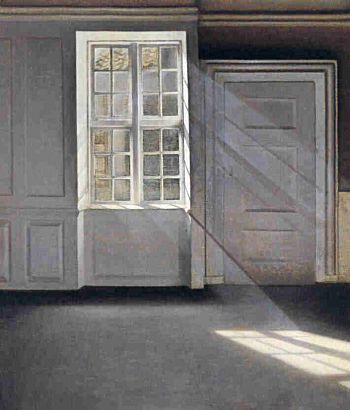
Vilhelm Hammershøi
1864 -1916
Vilhelm Hammershøi: The Poetry of Silence
28 Jun—7 Sep 2008 via ReadySteadyBlog
_______________________
A Wrench in the Machine for Living: Frank Gehry Comes to Brooklyn
Charles Taylor reviews From a Cause to a Style: Modernist Architecture's Encounter with the American City by Nathan Glazer
It’s no accident that the fascist potential in modern architecture has been clearest to those who saw it firsthand. Writing about the shift in Britain from the semi-detached suburban homes of the 1930s to the anonymous blocks of estate housing built after the Second World War, the filmmaker John Boorman said, “Le Corbusier’s manic followers descended like shock troops bringing more destruction to England than Hitler.” Members of the Situationist International went further. A 1954 issue of potlatch, the SI’s bulletin of resistance, referred to “Le Corbusier Sing-Sing” and read, “He builds morgues for an era that well knows what to do with them.” The memory of the war is in the SI’s words, the taste of ashes that is always the result of visions that attempt to overcome the human.
Sociologist Nathan Glazer is not temperamentally suited to that sort of confrontational talk. But the story Glazer tells in his latest book, From a Cause to a Style: Modernist Architecture’s Encounter with the American City, is of modern architecture’s willingness to subjugate people to its utopian fantasies. It’s a story told with a certain amount of regret. Once a modernist himself, Glazer has some residual affection for his youthful embrace of the movement. But he’s too good a critic to indulge in sentimentality. Toward the end of the book, Glazer sums up the prosecution’s case: “Modernist architecture began with social aims as strong as its aesthetic orientation, or stronger, but social objectives and interests have fallen away almost entirely, and aesthetic interests and judgment, ever more sophisticated and theory-based, have become predominant.”(....) Introducing his design for Atlantic Yards, Gehry spoke about trying to understand "the body language of Brooklyn." But the only language Gehry has ever been interested in is the language of Frank Gehry. To say he is defiantly noncontextual is to imply that context enters into his thought at all.
...(more)
_______________________
Private Property and Wealth
James Keye
On the one hand, we imagine our preeminence and believe our own imaginings. On the other hand ....
_______________________

Dunwich Beach
with the sea breach into Dingle Marshes
Andrew Stacey
_______________________
Spurious on regret
Regret, but not for what happened. Regret for what didn't happen, what failed to happen. A whole life could have been lived here. A whole life, opening out of itself like a universe (opening as a universe is said by cosmologists to open from a foam of bubbling beginnings). You are a placeholder for what might have happened. Your place marks the failure, the non-beginning of things. ...(more)
_______________________
101.(2) Each fragment of memory that I'll extirpate from time...(at) once will evaporate...
Once set down on paper, each fragment of memory (that is, a sequence of recollections put together like a textbook excercise or an elucidation for my book (a moralized prose recollection) becomes, in fact, inaccessible to me. This probably doesn't mean that the record of memory, located under my skull, in the neurons, has disappeared, but everything happens as is a transference had occurred, something in the nature of a translation, with the result that ever since, the words composing the black lines of my transcriptions interpose themselves between the record of memory and myself, and in the long run completely supplant it.
-
Jacques Roubaud, The Great Fire of London, translated by Dominic Di Bernardi
_______________________
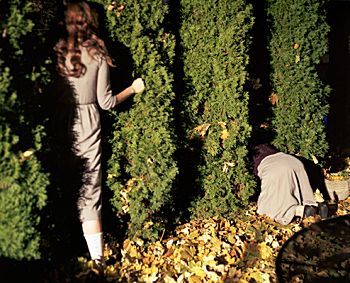
From The Secret World
Anastasia Cazabon
via Exposure Project
_______________________
the darkness (a personal essay on addiction)
Crispin Sartwell
... though addiction makes us lie, feeds on lies, it also finally - or at least this is what I hope - makes the falsity of these lies undeniable. Peel back the lies and you find, at the heart, nothing. And arriving at nothing is finding the truth.
I worry that in finding what we need to recover and to forgive, finding God or identifying our actions as a disease, we just find more illusions, that we're still, after all the awful confrontation with the truth, lying to ourselves. I want any illusion that will keep me alive. And I want out of all illusions, to see plainly the awful heart of reality.
I turned fifty yesterday, itself something of an achievement in my world, and I keep wanting to be alive, to believe love can be real, to grow tomatoes, to take care of children. My little woods are beautiful and alive with birds, this time of year. There's something that so far keeps me quitting, which is why I've outlasted most of the people and things I've loved. I still want it all to make sense, and still suspect that every way of making it make sense is another layer of falsehood. But at this moment the only account that's true to my experience is one that keeps faith with the senselessness, the sheer loss, and leaves it at that. ...(more)
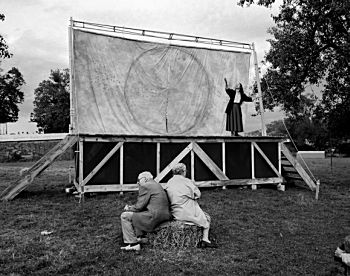
Modèle Français
Jean-Marc Bodson
Soyons.net via Mrs. Deane
_______________________
If every second of our lives recurs an infinite number of times, we are nailed to eternity as Jesus Christ was nailed to the cross. It is a terrifying prospect. In the world of eternal return the weight of unbearable responsibility lies heavy on every move we make. That is why Nietzsche called the idea of eternal return the heaviest of burdens(das schwerste Gewicht).
If eternal return is the heaviest of burdens, then our lives can stand out against it in all their splendid lightness.
But is heaviness truly deplorable and lightness splendid?
The heaviest of burdens crushes us, we sink beneath it, it pins us to the ground. But in the love poetry of every age, the woman longs to be weighed down by the man's body. The heaviest of burdens is therefore simultaneously an image of life's most intense fulfillment. The heavier the burden, the closer our lives come to the earth, the more real and truthful they become.
Conversely, the absolute absence of a burden causes man to be lighter than air, to soar into the heights, take leave of the earth and his earthly being, and become only half real, his movements as free as they are insignificant.
What then shall we choose? Weight or lightness? The Unbearable Lightness of Being
Milan Kundera
Translated from the Czech by Michael Henry Heim
download
_______________________
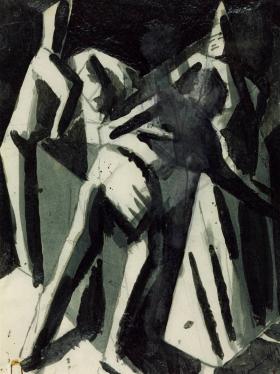 players
David Bomberg
1890 - 1957
_______________________
Radical Particularity, Critical Regionalism, and the Resistance to Globalization
Barrett Watten
... radical particularity as a formal device depends on the discrepant superimposition of culturally saturated spaces, and that it re-presents, often in the spatial form of disjunct "bits" of language that we visually identify as a "Language poem" (or variant), a way of concretizing and comprehending such disjunctions. As a cultural form, language-centered writing, as it re-presents the radical particularity of disjunct experience that cannot be totalized, is relative to its negotiations with cultural space. The following pay-offs follow from this claim: 1) there is no universalizing cultural politics possible in the forms of radical particularity or the "turn to language." Rather, the discrepant forms of the avant-garde may depend on the re-mapping of territorial forms that are bounded and named, such as the nation state, as well as those that are nonidentical and open, such as "Language writing." Insofar as identity and nonidentity depend on identification with spatial form at such sites, there is no privilege for nonidentity as a cultural politics. 2) Thus, the center/periphery model of metropolitan modernity is only one of many spatial configurations for the kinds of spatial re-mappings that lead to new cultural forms. The history of "regions" of modernity needs to be rethought in ways that contest the center/ periphery model and focus on spatial re-mappings whose negativity ends not in the material particularity of radical form but in the specific discrepancies of language and culture it enacts. ...(more)
_______________________

Fishing Net, Brittany, France
Silentium
Thorsten Schimmel
_______________________
Policing the Convergence of Virtual and Material Worlds
"The True Object of Police is Man."
Dion Dennis
ctheory
 The question remains as to what bureaucratic and political assemblage might plausibly govern national and global systems, so informed by this "New Protestant Ethic." In this transitional period between the postmodern and the technologically networked un-modern, the de facto emergence of a neo-Polizeiwissenschaft points, ultimately, to notions of policing and social order that can be plausibly called Neo-Cameralist. The current Neo-Cameralism/Neo-Polizeiwissenscchaft formation fuses a late 18th Century, authority-driven administrative proto-rationalism with social, economic, religious and political values uncannily resonant with early 21st Century Empire. While the prerogatives of the CEO replace that of the Divine Right of Kings, as the reigning governance ideology, in practice, however, the distance between the archetypal "benevolent despot" and the contemporary "unitary executive" is startlingly short. Neo-Cameralism and its neo-Polizeiwissenschaft techné is a repetition with a difference, a reverse temporal and ideological folding, a networked iteration. In the midst of this transition, the virtual is fusing with the material, as the scope and goals of policing are broadly redefined, easily outstripping the mid-and-late 20th Century notion of policing, in the process....(more) The question remains as to what bureaucratic and political assemblage might plausibly govern national and global systems, so informed by this "New Protestant Ethic." In this transitional period between the postmodern and the technologically networked un-modern, the de facto emergence of a neo-Polizeiwissenschaft points, ultimately, to notions of policing and social order that can be plausibly called Neo-Cameralist. The current Neo-Cameralism/Neo-Polizeiwissenscchaft formation fuses a late 18th Century, authority-driven administrative proto-rationalism with social, economic, religious and political values uncannily resonant with early 21st Century Empire. While the prerogatives of the CEO replace that of the Divine Right of Kings, as the reigning governance ideology, in practice, however, the distance between the archetypal "benevolent despot" and the contemporary "unitary executive" is startlingly short. Neo-Cameralism and its neo-Polizeiwissenschaft techné is a repetition with a difference, a reverse temporal and ideological folding, a networked iteration. In the midst of this transition, the virtual is fusing with the material, as the scope and goals of policing are broadly redefined, easily outstripping the mid-and-late 20th Century notion of policing, in the process....(more)
image by Mieczyslaw Górowski
_______________________
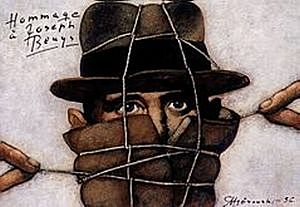
Hommage a Joseph Beuys
Mieczyslaw Gorowski 1 2 3
_______________________
The Christo-Terminator
The Unsustainable Present, the Nostalgic Glance Back as Prequels to the New American Legitimation Principle
Dion Dennis
Let's give this intolerant "slouching beast" a name: Call it the Christo-Terminator, a Borg-like fusion of the Dominionist, the skilled media manipulator , and the techno-soldier. I ask about its ancestors: Is this Christo-Terminator, the anti-Leviathan, the return, after 350 years, of the Cromwellian repressed, reborn on American soil? And if this is so, what kind of world is the Boomer generation bequeathing to its children, in the near and longer term?...(more)
more essays by Dennis at c theory
_______________________
Attack on Georgia Gives Boost To Big U.S. Weapons Programs
August Cole
wall street journal
.....................................................
Fear, Procurement, Profit: Permanent War and the American Way
Chris Floyd
Now, the Russian situation makes the debate over the equipping of the U.S. military a front-burner issue. "The threat always drives procurement," said a defense-industry official. "It doesn't matter what party is in office."
And here our candid if unnamed war-profit maven has neatly encapsulated both the last century of American policy – and the next century as well: "The threat always drives procurement. It doesn't matter what party is in office." His vatic pronouncement should be emblazoned on billboards, streamed constantly beneath the natterers on TV news, and chiseled in marble on the Capitol Dome. For it is, in a very real sense, what America is about today: Threat. War. Procurement. Profit.
And never doubt the bipartisan nature of this self-devouring system. (....)
So the beat – and the beat-downs – will keep going on, around the world, and fear will keep driving procurement, no matter what party is in office. As long as we want to guzzle and glut and "project dominance" in every corner of the world, war is all we've got. ...(more)
thanks to Steven K. Baum who has resumed blogging at
Ethel the Blog Shandean peregrinations through the multiverse.
_______________________

Fence Protecting the Dunes
Brittany, France
Thorsten Schimmel

Ulukhaktok (Holman)
.....................................................
Knowing Places: The Inuinnait, Landscapes and the Environment
Béatrice Collignon
Review by Rob Shields
Space & Culture
Collignon offers a very readable and important account of place-naming amongst the Inuinnait, the Inuit who live in the western areas of the Canadian Arctic Archipelago. Her work is centred specifically in and around Ulukhaqtuuq ([Ulukhaktok] formerly Holman) on Victoria Island. She marvellously describes the cultural and economic schanges which are resulting in a loss of geographical knowledge and declining familiarity with the region. While,
‘the Baffin Islanders made use of the increase range of the machines…Inuinnait have primarily taken advantage of the speed. They do not travel farther, but do not stop at the traditional staging areas anymore and they go “back and forth” more often….from the 1980s onward, snowmobiles…have been a means toward a life increasingly centred in and around the settlement.’ (p.188)
The result of several sojourns and over more than a decade by the French anthopologist, the book is an excellent translation of her Ph.D. research for the benefit of northern residents.(....)Given the way enacted knowledge works….The Inuinnait framework of geographic knowledge is a structure that resides in the mind, ready for use when called upon. When needed, it springs to life and becomes a working paradigm. An empty structure when out of context, this paradigm can only exist in the context of a particular situation.’ (p.155)
In sum, this toponymy does not simply a matter of geosophy, as some readers may conclude. It suggests not an abstract but a real, qualitative geography which truly is ‘landscape’ and not merely terrain. What is useful is the twin ideas of a, first, a ‘framework’ even if this sounds too much like an abstraction rather than also something imagined. And second, a ‘paradigm’ which again doesn’t communicate the sense of lived and embodied understanding....(more)
_______________________
A Weeknight Before the Turn of the Century
Klas Östergren
Translated from the Swedish by Tiina Nunnally
words without borders
Access to a language is no guarantee of spiritual well-being. Words are unreliable; they can alternately heal and tear apart. For the person who takes words seriously, the manipulation of them is often filled with anguish and the strain associated with stressful decision-making situations. An author is constantly forced to make minor emergency landings in his language; words fail, thoughts don't take off. The normal state is a quiet panic. It's possible that words release a chemical substance, a type of adrenaline not known until now, a substance that causes harm when it's released in large quantities and assumes too high a concentration in the body. A toxin belonging to a specific syntax. An addictive illusion of freedom. It's not insignificant when someone sits in judgment over writers, or decides to admire them. Writers probably should be neither judged nor admired. That was actually where I was heading all along. Toward a reasonable expectation....(more)
_______________________
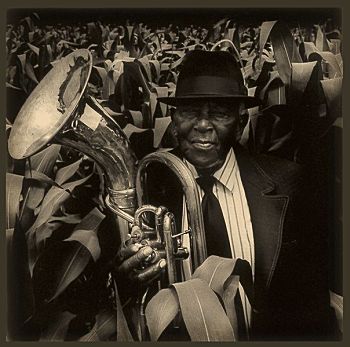
cooter in the corn with horn
Jack Spencer
_______________________
federman frenzy
the cult in culture
the me in memory
the he in his story
encounters with Raymond Federman
camelia elias
editor
also available for purchse (lulu)
contents
Take It, Leave It, Fold It:
Playing with Raymond Federman
Camelia Elias
Noodling Around:
on a frame-breaking [de]tour through Federman's surfi ctions
Lisbeth Rieshøj Amos
Hypothetical Reality:
Federman's Narrative Strategy
Jesper Christensen
Second Thoughts:
Federman’s Cultural and Individual Memory in The Twofold Vibration
Bent Sørensen
Sesame Undone:
Negotiations of Virtual Space in Federman’s blog
[the laugh that laughs at the laugh....]
Camelia Elias
Epilog[ical] Encounters
Camelia Elias & Raymond Federman
.....................................................
Critifiction: Postmodern Essays
Raymond Federman
google books
_______________________
The Bilingualist
Raymond Federman
To answer the question I'm always asked [voyons réfléchissons] No I do not feel that there is a space between the two tongues that talk in me [oui peut-être un tout petit espace] On the contrary [plus ou moins si on veut] For me the one and the other seem to overlap [et même coucher ensemble] To want to merge [oui se mettre l'une dans l'autre] To want to come together [jouir ensemble] To want to embrace one another [tendrement] To want to mesh one into the other [n'être qu'une] Or if you prefer [ça m'est égal] They want to spoil and corrupt each other [autant que possible] I do not feel as some other bilingualists have affirmed that one tongue is vertical in me the other horizontal [pas du tout] If anything my tongues seem to be standing or lying always in the same direction [toujours penchées l'une vers l'autre] Sometimes vertically [de haut en bas] Other times horizontally [d'un côté à l'autre] Depending on their moods or their desires [elles sont très passionnées vous savez] Though these two tongues in me occasionally compete with one another in some vague region of my brain [normalement dans la partie supérieure de mon cerveau] More often they play with one another [des jeux très étranges] Especially when I am not looking [quand je dors] I believe that my two tongues love each other [cela ne m'étonnerait pas] And I have on occasion caught them having intercourse behind my back [je les ai vues une fois par hasard] but I cannot tell which is feminine and which is masculine [personnellement on s'en fout] Perhaps they are both androgynous [c'est très possible]
_______________________
“May Christ Send You Sorrow and a Serious Illness”
Malcom Lowry responds to Jacques Barzun
from The Voyage that Never Ends, uncollected writings edited by Michael HofmannHarpers
I have just got another batch of reviews, all of them good, and all of them more irritating than yours. For another, the book is to be translated into French: the very tough editors, I am relieved to say, think more highly of it than you, which is something. And for another I just have news from England that one of my best friends–Anna Wickham, the poet, if you’re interested–has just hanged herself in London.
God has raised his whip of Hell
That you be no longer weak
That out of anguish, you may speak
That out of anguish, you may speak well.
She once wrote. My wife, by a coincidence having bought me a week ago, in Canada, the only edition of her poems (praised by D. H. Lawrence–and why didn’t you drag him in?) that can have been sold in 20 years, bought them for me indeed two days before Anna died. So life is too short or something. via the Literary Saloon
_______________________
 beach people
Jack Spencer
_______________________
"At the petabyte scale, information is not a matter of simple three- and four-dimensional taxonomy and order but of dimensionally agnostic statistics. It calls for an entirely different approach, one that requires us to lose the tether of data as something that can be visualized in its totality. It forces us to view data mathematically first and establish a context for it later."
Will the Data Deluge Makes the Scientific Method Obsolete?Chris Anderson edge
Sixty years ago, digital computers made information readable. Twenty years ago, the Internet made it reachable. Ten years ago, the first search engine crawlers made it a single database. Now Google and like-minded companies are sifting through the most measured age in history, treating this massive corpus as a laboratory of the human condition. They are the children of the Petabyte Age.
The Petabyte Age is different because more is different. Kilobytes were stored on floppy disks. Megabytes were stored on hard disks. Terabytes were stored in disk arrays. Petabytes are stored in the cloud. As we moved along that progression, we went from the folder analogy to the file cabinet analogy to the library analogy to — well, at petabytes we ran out of organizational analogies....(more)
via Richard L. W. Clarke at Philosophy's Other: Theory On The Web
_______________________
Atoms in the Blogosphere
Beth at Cassandra Pages asks
...do you think social networking sites have siphoned off some of the interactive energy that used to be more prevalent in blogging? Are we overwhelmed, and reading and linking less because of the sheer volume? What else can we do to encourage and help one another? Why do you blog, and have your own expectations changed over time?
_______________________
Wag the Dog
How To Conceal Massive Economic Collapse
Ellen Brown
_______________________
Manufactured Revolutions?
Dragan Plavsic
In recent years, the US has worked hard to instrumentalise the velvet revolution, to exploit it for its own ends. With massive funds, it has used rigged elections to help trigger regime change, as in Serbia and Ukraine. It has anticipated revolt by cultivating oppositionists to lead it, as in Georgia. It has established and maintained a ‘democratic’ infrastructure of NGOs, media outlets and publishing houses that has spawned a host of intellectuals and activists for whom the most viable economic and political model is still the one offered by the victor of the Cold War. This infrastructure sustains US-friendly opposition groups who can emerge to lead sudden revolts, as in Kyrgyzstan. For all these reasons, US imperial manipulation today is qualitatively greater than it was in 1989. Now it has largely unfettered access to societies closed to it before the fall of the Soviet Union. And there it can freely target established opposition groups instead of secretly infiltrating the twilight world of the lonely dissident. This is why it is justified to talk of the degeneration of the ‘velvet revolution’.
Nevertheless, there is another side to this story. If US strategy is indeed to work, it has ultimately to rely on popular forces to push change through. And this carries real dangers. Above all, there is the danger that the popular forces the US seeks to manipulate will sooner or later strike out in an uncontrollable direction of their own, well beyond the remit of the bourgeois oppositions the US would have them follow. Indeed, from the miners at Kolubara to the landless squatters of Kyrgyzstan, the potential of these revolutions has been palpable. This is the core contradiction at the heart of US strategy. And this is why every crisis the US seeks to manipulate is also an opportunity for socialists to voice independent demands that can help to push the revolution to altogether greater democratic heights. ...(more)
_______________________

FREAK Musical STUNTS Make Fun and PROFITS
Modern Mechanix
Yesterday's Tomorrow Today
"A Strategic Retreat Into Yesterday’s Visions of an Analogue Tomorrow"
- Stephen Lewis (Hak Pak Sak )

South Glen Road Bridge
(Toronto, Canada)
Frank William Micklethwaite
1849 - 1925
Wikimedia Commons
thanks to James Bow
_______________________
The Old Future’s Gone: Progressive Strategy Amid Cascading Crises
Robert Jensen
We should struggle to build a road on which we can walk through those troubles — if such a road is possible — but I doubt it’s going to look like any path we had previously envisioned, nor is it likely to lead anywhere close to where most of us thought we were going....(more)
_______________________
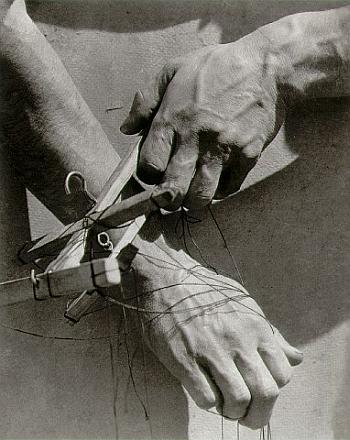
Hands of the puppeteer
Tina Modotti
1929
Tina Modotti: Radical Photographer
Margaret Hooks
Google Books
Shadows, Fire, Snow
The Life of Tina Modotti
Patricia Albers
Google Books
Tina Modotti: Life, Art, And Revolution
Gillian McIver
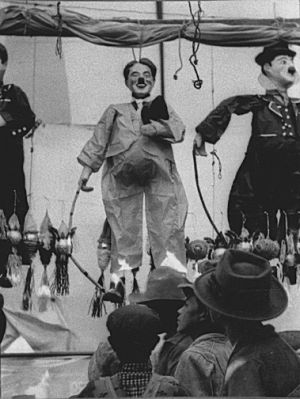
Piñatas
Tina Modotti
ca. 1926
_______________________
Is It Time? Five Arguments For An Election NOW
balbulican
3) We now have a much clearer understanding of what the Cons really do stand for. Their contempt for Aboriginal people, their attack on environmental policy, their commitment to an ongoing war in Afghanistan, their loathing of cultural programs and products, their kowtowing to industry and indifference toward consumers, their surprising contempt for the mechanisms of government - these aren’t matters for speculation anymore. They’re the real legacy of this government, now part of the record. When this minority was elected, cautious voters simply didn’t know what they were getting - what this strange fusion of classic conservatives, prairie populists, Christian fundamentalists, Red Tories and wistful Republican-wannabes was actually going to mean. Now we do: we’ve seen which threads of the party have come to dominate policy and decision making, and which have quietly faded to the back benches. You may like that, or you may not: but at least now we know exactly what kind of pig is in that poke.
4) We know where they want to take us. When they weren’t simply Liberal bashing in the last election campaign, the Conservative mantra was “We’re Not As Scary As We Look”. And as noted in Point 3, many of us took them at their word; and their minority status has actually kept them within reasonable bounds, despite the periodic, staged eruption of low-key, Friday-afternoon low visibility programicide. But they’ve been chafing at the bit to get on with it. Given a majority and four years, does anyone still believe that Canada will still have ANY arts or cultural programs? ANY meaningful environmental protection? A Wheat Board? As Conservative Minister of Agriculture summarized the threat clearly: “When we come back with a majority, then all bets are off.”...(more)
_______________________
Death of globalisation consensus
Dani Rodrik
The world economy has seen globalisation collapse once already. The gold standard era – with its free capital mobility and open trade – came to an abrupt end in 1914 and could not be resuscitated after the First World War. Are we about to witness a similar global economic breakdown?
The question is not fanciful.(....)
There is no global anti-trust authority, no global lender of last resort, no global regulator, no global safety nets, and, of course, no global democracy. In other words, global markets suffer from weak governance, and therefore from weak popular legitimacy.(....)
There was a time when global elites could comfort themselves with the thought that opposition to the world trading regime consisted of violent anarchists, self-serving protectionists, trade unionists, and ignorant, if idealistic youth. Meanwhile, they regarded themselves as the true progressives, because they understood that safeguarding and advancing globalization was the best remedy against poverty and insecurity.
But that self-assured attitude has all but disappeared, replaced by doubts, questions, and scepticism. Gone also are the violent street protests and mass movements against globalisation. What makes news nowadays is the growing list of mainstream economists who are questioning globalisation's supposedly unmitigated virtues....(more)
_______________________

Staircase, Mexico
Tina Modotti
August 16 (or 17) 1896 – January 5, 1942
_______________________
electroacoustic works by Jean Dubuffet
In 1960-61, he recorded himself playing a variety of instruments for which he had no training, and used a mixing box to produce musique concrete works. The relative primitiveness of his equipment gives them a raw sound reminiscent of the pioneering musique concrete works of Pierre Schaeffer and Pierre Henry, from a decade earlier. Ilhan Mimaroglu came across some of these works, and was so taken with them that he released an LP devoted to them on Finnadar Records (SR 9002). This installment is a transcription of that LP.
Avant Garde Project Archive
_______________________
The 12 books a bookseller simply cannot afford not to stock
via new pages
_______________________

Portrait of Edward Weston
Tina Modotti
1924
1 2 3
|


























































 The question remains as to what bureaucratic and political assemblage might plausibly govern national and global systems, so informed by this "New Protestant Ethic." In this transitional period between the postmodern and the technologically networked un-modern, the de facto emergence of a neo-Polizeiwissenschaft points, ultimately, to notions of policing and social order that can be plausibly called Neo-Cameralist. The current Neo-Cameralism/Neo-Polizeiwissenscchaft formation fuses a late 18th Century, authority-driven administrative proto-rationalism with social, economic, religious and political values uncannily resonant with early 21st Century Empire. While the prerogatives of the CEO replace that of the Divine Right of Kings, as the reigning governance ideology, in practice, however, the distance between the archetypal "benevolent despot" and the contemporary "unitary executive" is startlingly short. Neo-Cameralism and its neo-Polizeiwissenschaft techné is a repetition with a difference, a reverse temporal and ideological folding, a networked iteration. In the midst of this transition, the virtual is fusing with the material, as the scope and goals of policing are broadly redefined, easily outstripping the mid-and-late 20th Century notion of policing, in the process.
The question remains as to what bureaucratic and political assemblage might plausibly govern national and global systems, so informed by this "New Protestant Ethic." In this transitional period between the postmodern and the technologically networked un-modern, the de facto emergence of a neo-Polizeiwissenschaft points, ultimately, to notions of policing and social order that can be plausibly called Neo-Cameralist. The current Neo-Cameralism/Neo-Polizeiwissenscchaft formation fuses a late 18th Century, authority-driven administrative proto-rationalism with social, economic, religious and political values uncannily resonant with early 21st Century Empire. While the prerogatives of the CEO replace that of the Divine Right of Kings, as the reigning governance ideology, in practice, however, the distance between the archetypal "benevolent despot" and the contemporary "unitary executive" is startlingly short. Neo-Cameralism and its neo-Polizeiwissenschaft techné is a repetition with a difference, a reverse temporal and ideological folding, a networked iteration. In the midst of this transition, the virtual is fusing with the material, as the scope and goals of policing are broadly redefined, easily outstripping the mid-and-late 20th Century notion of policing, in the process.